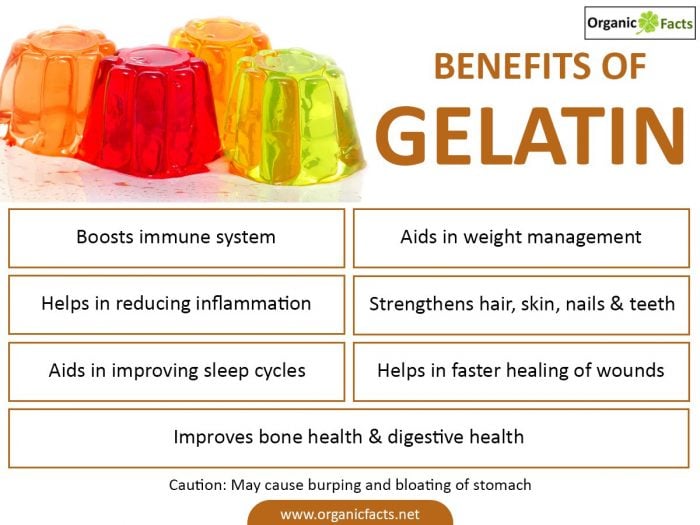The health benefits of gelatin include its ability to improve the skin, hair, and nail growth, reduce inflammation of the joints, tone up the body and skin, improve digestion, boost muscle growth, strengthen blood vessels and intracellular networks, optimize the metabolism, detoxify the body, strengthen the bones, boost the immune system, help to regulate weight, eliminate sleep disorders, and help to speed up the healing of wounds.
Gelatin
Gelatin is a unique element in many people’s daily diets. It is made of collagen that is acquired from various animal by-products. It is a brittle, colorless, translucent, and flavorless substance. That doesn’t sound particularly interesting, but it is an essential part of many gel-like substances, including jellies, ice creams, yogurts, gummy candies, marshmallows, certain gelatin desserts, and various dips. In non-food applications, it is even used in photography, pharmaceuticals, and various cosmetic products. You can get gelatin in sheets, granules, or powdered form for home use. You can also take gelatin supplements to get all of the health benefits in a concentrated form. [1]
Basically, gelatin is a combination of proteins and peptides, making it a wonderful source of amino acids that are essential for a variety of body processes. Furthermore, since they are proteins derived from animal products, our body has to do less work to break them down than is required for plant proteins before changing them into usable forms for humans. It is often acquired from meat and leather products, but fish products have recently become popular sources as well. Most commonly, it is manufactured through pork skins, horses, and cattle bones. It is a massive industry on a global scale, and more than 800 billion pounds are produced every year for various uses. [2]

Gelatin may offer nutritional benefits, ranging from skin health to tissue repair. Photo Credit: Shutterstock
| Serving Size : | |
|---|---|
| Nutrient | Value |
| Water [g] | 13 |
| Energy | 335 |
| Energy [kJ] | 1402 |
| Protein [g] | 85.6 |
| Total lipid (fat) [g] | 0.1 |
| Ash [g] | 1.3 |
| Calcium, Ca [mg] | 55 |
| Iron, Fe [mg] | 1.11 |
| Magnesium, Mg [mg] | 22 |
| Phosphorus, P [mg] | 39 |
| Potassium, K [mg] | 16 |
| Sodium, Na [mg] | 196 |
| Zinc, Zn [mg] | 0.14 |
| Copper, Cu [mg] | 2.16 |
| Manganese, Mn [mg] | 0.11 |
| Selenium, Se [µg] | 39.5 |
| Thiamin [mg] | 0.03 |
| Riboflavin [mg] | 0.23 |
| Niacin [mg] | 0.09 |
| Pantothenic acid [mg] | 0.13 |
| Vitamin B-6 [mg] | 0.01 |
| Folate, total [µg] | 30 |
| Folate, food [µg] | 30 |
| Folate, DFE [µg] | 30 |
| Choline, total [mg] | 38.5 |
| Fatty acids, total saturated [g] | 0.07 |
| 14:0 [g] | 0.01 |
| 16:0 [g] | 0.04 |
| 18:0 [g] | 0.03 |
| Fatty acids, total monounsaturated [g] | 0.06 |
| 16:1 [g] | 0.01 |
| 18:1 [g] | 0.05 |
| Fatty acids, total polyunsaturated [g] | 0.01 |
| Threonine [g] | 1.48 |
| Isoleucine [g] | 1.16 |
| Leucine [g] | 2.45 |
| Lysine [g] | 3.46 |
| Methionine [g] | 0.61 |
| Phenylalanine [g] | 1.74 |
| Tyrosine [g] | 0.3 |
| Valine [g] | 2.08 |
| Arginine [g] | 6.62 |
| Histidine [g] | 0.66 |
| Alanine [g] | 8.01 |
| Aspartic acid [g] | 5.27 |
| Glutamic acid [g] | 8.75 |
| Glycine [g] | 19.05 |
| Proline [g] | 12.3 |
| Serine [g] | 2.61 |
| Sources include : USDA [3] | |
Nutritional Value of Gelatin
In terms of the nutritional composition of gelatin, it is a good source of numerous vitamins, minerals, and organic compounds, including copper, selenium, and phosphorous, along with being an excellent source of proteins. By dry weight, gelatin is 98-99% protein, but it does not contain all of the necessary amino acids for humans, meaning that it is not a complete protein source. However, it is still an important source of many proteins that our body needs. [4]
Health Benefits of Gelatin
Let’s take a look at some of the health benefits found in gelatin that make it such a useful addition to our diet.
Weight Management
Certain studies have shown gelatin to be an important element that increases production of HGH (Human Growth Hormone), while also stimulating the metabolism through its nutrients and amino acids. Furthermore, it’s fiber and protein content helps make you feel full, which eliminates your cravings for food and reduces overeating. This makes it a useful food item for people trying to manage their weight naturally. [5]
Wound Healing
Proteins are an essential part of wound healing, and gelatin contains a specific amino acid called glycine, which is directly connected to reducing inflammation. This means that a wound can move from the inflammation stage to the healing stage much faster, and the additional amino acids and proteins help to develop new skin and scar tissues. [6]
Nails, Hair, and Teeth
People are always trying to find new ways to take care of their hair, skin, nails, and teeth. Keratin, one of the proteins found in gelatin, is found in high quantities in those parts of our body and helps to keep them strong. Therefore, consuming gelatin is a simple and effective way to keep those superficial elements of our body in a good shape. [7]
Bone and Joint Health
The proteins found in gelatin, as well as the selenium, phosphorus, and copper found in significant amounts can help keep your bones strong and increase the bone mineral density in your body. This can be an important defensive mechanism against osteoporosis, while certain other amino acids found in gelatin are known to reduce inflammation, meaning that conditions like arthritis can also be helped by consuming gelatin. Furthermore, gelatin can contribute to the development of cartilage, which strengthens joints and bones and extends their longevity. [8]
Immune System Booster
Proline, another amino acid found in significant amounts in gelatin, has been connected with improved immune function in animals, meaning that we can improve our health and general ability to fight off infections and disease by consuming gelatin in our daily diet. [9]
Sleep Aid
Studies have connected glycine to improved sleep cycles and stimulation of certain neurotransmitters and enzymes that increase the quality and duration of sleep. Proper sleep cycles and rest for the body is also important for the general functioning and metabolism of the body and affects the health in many ways. [10]
Skin Tone and Anti-Aging Effects
Gelatin is basically dried out collagen, which is one of the most important elements in our skin to maintain elasticity and tightness between dermal cells. By increasing the amount of collagen through consuming gelatin, we can keep our skin tight and look younger far into our older years. [11]
Metabolic Regulation
As mentioned earlier, gelatin is a wonderful source of amino acids and is close to a complete protein source. This means that all of the metabolic activities of the body are improved by eating gelatin, including the creation of new cells, the elimination of sick or unhealthy cells, increase in muscles, proper usage and absorption of nutrients, and a number of other essential functions in our body. [12]

Gelatin has a variety of uses. Photo Credit: Shutterstock
Digestive Health
Gelatin has been found to naturally bind to water, thereby thickening up stools, much the same way that fiber does. By improving the bulk of our stool, gelatin is able to reduce conditions like constipation, stimulate digestive juices, and increase peristaltic motion in the smooth intestinal muscles. This can help improve many different health problems since constipation and the inability to properly absorb nutrients can be a major problem for our health. [13]
Allergy Relief
Studies have connected gelatin to healing the digestive tract, and many allergic reactions are often attributed to a “leaky gut” that is unable to process certain substances. Therefore, by healing any tears or issues in the digestive tract, gelatin is able to heal allergic problems and make our body open to handle a variety of food. [14]
Word of Caution: The only commonly reported side effects of gelatin are burping, bloating, and an upset stomach, but these reactions are rare. Furthermore, there was a brief time when people were concerned about animal diseases, such as Mad Cow Disease, being transferred into gelatin. However, this has never been confirmed and no health risks have been stated by Food and Drug Administrations throughout the world.
